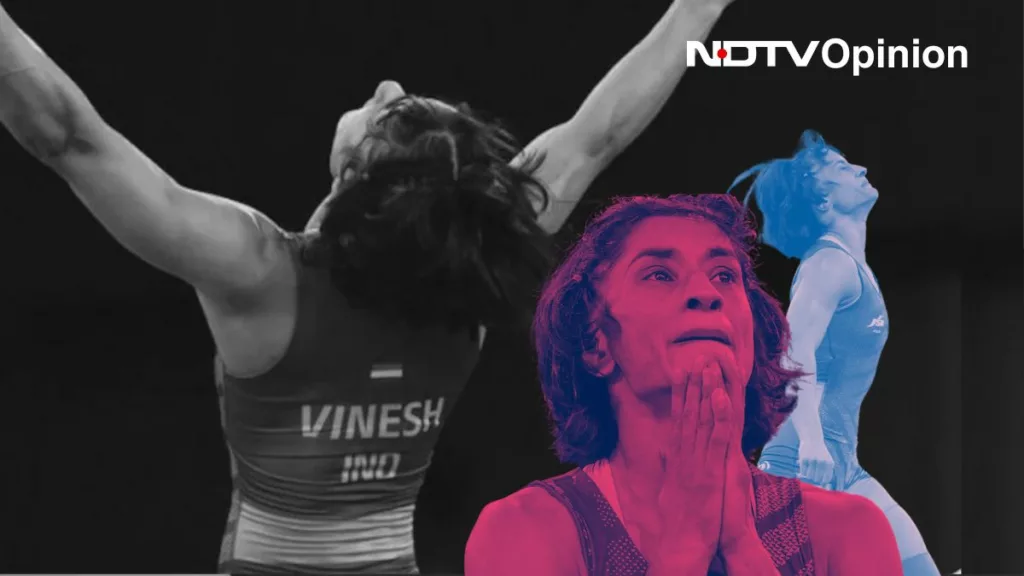Some victories are sweeter than others, some defeats more bitter, whatever the arena be. But what about the cruelty of fate? How does one take heart? The vagaries of destiny are more ruthless than any opponent’s blow. They also feel more personal, as if the player in the arena is an alter ego of any and all of the spectators near and far. Vinesh Phogat’s Paris Olympics performance is one such instance of the blurring of these boundaries. Many of her cheerleaders today, however, ought to be ashamed of themselves. Whether they will be is anyone’s guess.
Phogat has announced her retirement after being disqualified in the Paris Olympics just before her final bout. In Book 22 of the Iliad, Zeus-the king of gods-weighs the fates of Achilles and Hector before their first and final fight. Just like the scales dipped for Hector, foretelling his death, they foretold the death of Phogat’s career. The past, present, and future of her sporting career weighed lighter than the weight mandates of her category. Her fate, quite literally, was decided by the wanton scales. This is a tragedy of epic proportions.
It Was More Than Just A Medal
It’s not just a medal that Phogat lost; she lost something a lot more precious. Closure. Dragged on the ground, demeaned, and derided during the athletes’ protest against sexual harassment, Phogat resolved to avenge her honour and that of many women athletes. She may have still achieved a watered-down form of vindication, but the optics are missing. In a spectacle-crazed nation, visual redemption is the only redemption.
The sports culture of India can be defined by a peculiar tendency to delink the sport from the sportsperson. We, often lose the common-sense understanding that sportspersons are humans with all their foibles and frailties. We deify them with each victory and demonise them should they do anything but win medals. When it comes to women athletes, this treatment is starkly naked, thanks to the good old patriarchy. Men just have to be born while women have to be Olympic champions, along with everything else, to even claim parity. And even then it is denied to them.
And women are growing tired. One day, they might just give up. Many have. Simon Biles did. Sakshi Malik did. Naomi Osaka did. They tell themselves that enough is enough; they need not prove themselves yet again. Vinesh Phogat is not one of them. She knew she had to get on the Olympic podium to get her countrymen to listen to her. This was meant to be her soapbox.
Who Exactly Is A ‘Woman’ In Sports?
Women athletes are doubly disadvantaged, for they choose an arena that essentially devalues feminine attributes of their constitution. Athleticism is ostensibly partial to masculinity. Sports may give the impression of blurring gender boundaries, but the reality is the opposite. In the sporting arena, gendered attitudes are not only underscored but also magnified. Women are celebrated for exhibiting masculinity-not too much of it, though, lest they be accused of being a ‘man’.
Debates on gender bias in every sport in terms of legitimacy, pay, attention, etc, are so old and repetitive that even the staunchest of equality advocates are getting jaded. The more things change, the more they stay the same. This is particularly true of India, which also has a peculiar problem of one sport cannibalising every other. Women athletes in India, therefore, are heroes who must punch way above their weight every single time.
Phogat will soon be forgotten. She won’t appear on India’s list of Olympic medallists’ and nobody will care for what she went through before she fought her way to the finals of 2024 Olympics. Spectacles, as stated earlier, are important to engage fickle collective memory. The hurt and the heartbreak underscoring her retirement announcement ought to rekindle the fire in each woman athlete’s belly in India. It should remind them that they are, after all, on their own.
Triple Measures
Sylvia Burrow proposes that “impaired live options for participating and succeeding in sport undermine women’s autonomy”. Professional women athletes have to overcome that before taking their first step. When women enter competitive public spaces, they are already exhausted by all the behind-the-scenes fighting. Their opponents are not just in front of them but behind and alongside them. Each win, therefore, requires everything in triple measure: strength, resilience, will, and resources. Indian establishment and the public have been failing athletes for a long time. Women athletes in particular. Any show of support is but a blip on the radar.
Yet, the darned woman athlete takes our breath away.
(Nishtha Gautam is a Delhi-based author and academic.)
Disclaimer: These are the personal opinions of the author
